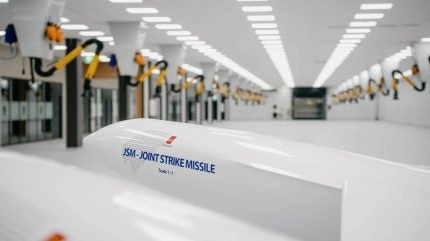Kongsberg’s New Grant to Fortify Japan’s F-35A Fleet
Kongsberg Defence & Aerospace has secured a contract worth NKr1.9bn ($171.72m) to supply its cutting-edge Joint Strike Missiles (JSM) to the Japan Air Self-Defense Force (JASDF) for their F-35A fighter jet fleet. This marks the growing partnership between Kongsberg and Japan, as it is the fourth follow-on contract since Japan first opted for the JSM in 2018.
 Joint Strike Missile is a crucial component of modern air defense.
Joint Strike Missile is a crucial component of modern air defense.
The JSM is a formidable weapon designed primarily for anti-surface warfare and land attack missions. Weighing in at 416kg and measuring 156 inches in length, this missile allows the F-35A to maintain its agility, range, and stealth without compromising payload capacity, as it can be carried internally within the aircraft. Its capabilities include high subsonic speeds, which play a critical role in modern aerial warfare. Supported by the Royal Norwegian Air Force, the missile is currently undergoing qualification and integration processes.
Eirik Lie, the president of Kongsberg Defence & Aerospace, emphasized the strategic importance of the JSM for Japan, stating,
“The fifth order for the Joint Strike Missile underlines the important role of the JSM in Japan’s national defence strategy and is another example of the close and growing relationship between Norway, Japan, and Kongsberg.”
The user community for the JSM has broadened significantly, now encompassing nations like Australia, Norway, and the United States Air Force. Just recently, Australia chose the JSM to enhance its Air Force’s long-range aerial launch capabilities destined for its fleet of 60 F-35A Lightning II fighter jets. This agreement is valued at approximately A$142m ($93.7m) and is set to commence deliveries in 2025.
In line with these developments, Kongsberg is also ramping up its manufacturing capabilities by establishing a missile production facility in James City County, Virginia. This facility will be integral in supporting the production of both the Naval Strike Missiles and the JSM, reinforcing the company’s commitment to meeting international defense demands.
 The expansion of missile production capabilities reflects growing global demand.
The expansion of missile production capabilities reflects growing global demand.
Kongsberg’s JSM features advanced technologies including highly accurate navigation systems and a unique low-altitude flight profile. One of its standout features is automatic target recognition, supported by an advanced imaging infrared seeker, enhancing its effectiveness in various combat scenarios.
As the geopolitical landscape evolves, nations are continuously seeking advanced capabilities to fortify their defense strategies. The contract with Japan not only demonstrates Kongsberg’s commitment to providing state-of-the-art military solutions, but it also signifies the strengthening of global defense partnerships in a time of increasing security challenges. This contract emphasizes the importance of technological advancement in military applications, ensuring that nations remain equipped to handle modern-day threats effectively.
With further developments in both production and international agreements, Kongsberg’s future in defense manufacturing looks promising. The integration of JSM into the F-35A fleet will undoubtedly enhance Japan’s military readiness and strategic independence, paving the way for future advancements.
The ongoing collaboration between Japan and Kongsberg highlights the critical role of international partnerships in achieving effective defense strategies. As nations strive to maintain their sovereignty and security in an ever-changing world, such alliances may prove vital for achieving shared goals in a collective defense posture.


 Photo by
Photo by 










